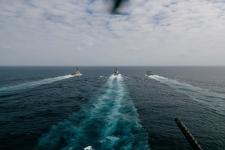Maritime security: How geopolitics hardens threat patterns at sea and challenges known solutions

Geopolitics is going to sea
Danish and international policy attention on maritime matters has in recent decades focused on maritime crime, e.g. piracy, illegal fishing and drugs trafficking. Yet threats to maritime security are less and less limited to maritime crime. In the face of the recent (re)turn to geopolitics in foreign policy, a global trend is emerging where regional waterways serve as spaces of power projection. Indeed, state and non-state actors are increasingly asserting control and coercion short of war.
Examples of state actors include tensions in recent years caused by China’s grey zone operations in the South China Sea and Iran’s harassment of oil tankers in the Strait of Hormuz since 2017. Both situations challenge international law, cause insecurity, disrupt international trade and the peaceful use of the oceans. More indirectly, the past decade of Russian aggression has caused members of the International Maritime Organisation to vote out Russia from its executive board, and members of the Arctic Council to pause collaboration but continue its working groups without Russian participation. The September 2022 North Stream explosions in the Baltic Sea are further examples. While the perpetrators have yet to be determined, European critical infrastructure was targeted through hybrid warfare. Examples of non-state actors are al Shabaab in both the terrorist Somali version and the militant Mozambican version. They use the maritime domain for illicit operations to promote their economic and political agendas. Further, the Iranian-backed Houthi militia has been fighting for power in Yemen for years and has raised the level of violence to unprecedented heights by attacking merchant vessels in the Red Sea since November 2023.
The manner in which threats and risks are developing at sea is likely to endure in the mid- to long-term future due to the shifts in international relations where geopolitics, geoeconomics and even the weaponisation of vital policy areas, such as trade and energy, are applied in certain foreign policy contexts. The maritime domain plays a significant role in such processes: the high seas – as opposed to sovereign territories on land – are ‘legally neutral’ spaces. This makes it possible to create strong political, economic and cultural messaging to the world through violent means but without infringing on any state’s sovereignty and territorial integrity. In other words, a relatively low risk-high gain effort short of war.
This trend has several implications. It firstly hardens threat patterns at sea compared to the modus operandi of maritime crime seen hitherto. Secondly, because new threat patterns involve not only criminal organisations but also political groups and states, there is a risk of weakening existing platforms for cooperation and fragmenting robust solutions to maritime insecurity. In many respects, international cooperation is already being challenged by the emergence of alternatives to the liberal world order and the growing assertiveness of the so-called Global South. But with new fault lines being drawn at sea between sovereign entities, or non-state actors’ claims to such, by way of the maritime domain being used for political and geopolitical contestations, the trend is consolidated. This, thirdly, leaves a policy and arguably operational void in which maritime domains and their resources may be further claimed by political groups, states and criminals alike.
Implications of geopolitics at sea in an African context
Maritime security in an African context is guided by the AU Integrated Maritime Strategy 2050 along with regional iterations. They are implemented in partnership with Denmark, the EU and other donors, who support capacity development of coastal states’ security architecture through civilian and military activities to counter maritime crime. Nonetheless, African waters are still inconsistently governed. This allows maritime crimes to linger with repercussions for coastal populations and the realisation of the UN Sustainable Development Goals at large. Moreover, the existing maritime security strategies may be further challenged in the future by the just discussed emerging trend of ‘geopolitics taking to the sea’. The following are key attention points:
Contemporary hardening of threats
One example here is the mentioned Houthi militia’s regional claims to power through attacks in the Red Sea. They do not operate in Africa, but their activities have economic and security spillover effects due to the shared waters between East Africa and the Arabian Peninsula. It is an international chokepoint for global trade and hosts several important port facilities on which several states and their populations rely for trade and aid.
Unlike Somali piracy (generally threatening the same shipping route), the Houthis are highly trained, heavily armed and associated with an antagonistic state. This renders it inappropriate to extend existing civ-mil policy instruments currently used to counter maritime crime. While Houthi operations are to some extent enabled by Iran, Iranian control over the Houthi movement is not absolute, and diplomatic avenues of engagement with either party is limited.
Potentially comparable levels and readiness of violence could be envisioned in other African waters, e.g. by the Mozambiquan al Shabaab insurgency and Nigerian Piracy Action Groups. Concern remains as to how to contain this heightened violent nature of maritime threat. Moreover, regional states will increasingly rely on data cables in efforts to digitalise coastal states, its ports and international shipping. Maritime militancy in the context of critical infrastructure and cyber security will also require consideration and the development of appropriate policy responses.
The role of external actors
Non-Western actors provide African leaders with alternatives to Western partnerships that mix politics, economy and security in potentially damaging ways.
Russia’s presence in African countries is, from a maritime perspective, centred around oil, e.g. Lukoil’s business with states in West Africa. With the West’s sanctions and new energy strategies after Russia’s invasion of Ukraine in February 2022, Russian economic and security interest in West African waters and ditto states may increase. To protect its interests, Russia deploys warships that patrol the Gulf of Guinea and have been involved in some counter-piracy activity. A concern could be whether Russia will deploy Wagner Group-like private security at sea as it does on land in e.g. the Sahel. And what effects Russian partnerships with African states may entail for Western cooperation with coastal states in the mid- to long-term.
China has broad maritime interests, e.g. its fishing fleets in East and West Africa and the construction of maritime ports and related infrastructure across several littoral and landlocked states, committing African governments under the Belt and Road Initiative. Public dept and practices that lack transparency are some of the effects of Sino-African partnerships. The connectivity projects give China access to African energy and minerals in global competition. China built its first overseas military base on the coast of Djibouti in 2017, which has caused some concern among Danish allies. While China is evidently filling an infrastructural gap in African states, the mode of collaboration is not always sustainable and run counter to Western aims.
Gulf states invest in African infrastructure, agriculture and other sectors. Investments reflect historical patterns of religious-cultural relations. While they are not conventional adversaries of Western security, their engagement with African elites is highly instrumental, politicised and securitised with repercussions for the maritime domain. The UAE and Saudi Arabia have leveraged relations with – and support to – African leaders to quell the influence of Iran and the Muslim Brotherhood, causing political strife and instability in its wake. They used relations to launch military campaigns from the Horn of Africa into Yemen. This again shows the spill-over effects that draw African maritime domains into Middle Eastern conflicts.
The shifts in continental agency
African political elites and electorates are leaning into geopolitical narratives, drawing on actorness and self-determination to pose the so-called Global South as a political and economic force, rather than a post-colonial recipient. It may in some instances complicate maritime security collaboration in ensuring that problems and solutions in African waters also align with European values and interests. This is already an issue. For instance in West Africa, some states’ willingness to combat maritime threats – which is important to European energy and trade – ranks second, as long as land-based security issues in the Sahel loom large(r) in the minds of African political elites and populations. There are also differing perceptions of what constitutes maritime threats, where illegal fishing is more pressing to some coastal states’ national economies and community livelihoods than piracy, which rather affects international shipping.
The differing agendas are already having operational repercussions. In the western Indian Ocean, the Somali government refused the regular 12-month renewal of a UN Security Council resolution in December 2021 sanctioning foreign warships in its territorial waters in the international fight against Somali piracy in the vital sea lanes connecting markets in Asia, the Middle East and Europe; for the first time since passing the first resolution on Somali piracy in 2008, only a three-month extension was granted in 2021. Moreover, the resolution was not renewed. When piracy attacks increased around December 2023, it posed regulatory and operational limitations to especially EU NAVFOR’s counter-piracy mission that protects merchant shipping.
Dilemmas and strategic concerns that Denmark needs to balance
To counter these trends and patterns, and to improve maritime security in an African context, particular areas of attention in Danish policy with partners in African countries could include a focus on the following issues:
Encouraging African agency while remaining a preferred partner
The agentive power conjured up in recent narratives about the Global South may both enable and constrain Denmark’s maritime security engagement and agenda(s) in Africa. On the one hand, the maritime domain beyond the 12 nautical mile limit is a global good. It serves as a relatively ‘neutral’ governance space in which common objectives can be pursued with both significant African and Danish interests at play. On the other hand, perceptions of post-colonial legacies persist when former empires operate in African waters and European maritime security providers are not perceived as an a priori impartial actor.
This demands an effort on the part of Denmark to both encourage agency and urge durable partnerships around maritime governance. In the face of other possible alliances, the Danish Foreign and Security Policy Strategy notion of pragmatic idealism may be put to the test in certain collaborations. Paving the way for partnerships, Denmark may initiate processes to identify and implement goals of shared interest from the broader AU peace and security agenda on countering radicalisation, violent extremism, terrorism and cyber security. This also enables anchoring efforts in a commitment to multilateralism, as laid out in the AU-EU Joint Declaration from February 2022 summit, and focusing on enhanced maritime domain awareness, capabilities, education and training as stipulated in the updated EU maritime security strategy from 2023.
Reforming policy to address hardened maritime threats
The increased hardening and heterogeneity of threats to maritime security in terms of actors (criminal, non-state and state) and activities (crime, hybrid threats and war-like attacks) do not necessarily make oceans more dangerous. But maritime risks and threats are less predictable and more complex to suppress. It follows that effectively countering maritime threats requires both flexible and elaborate responses.
The shift from ‘simple’ crime to heavily armed militia and state involvement in grey zone conflicts brings out very clearly how maritime insecurity is closely related to questions of good governance and political conditions on land, when state and state-like entities are increasingly the perpetrators. It requires rethinking conventional approaches that Denmark has hitherto applied to maritime security, hereunder the Peace and Stabilisation Fund and other civil-military policies, that – all things equal – primarily deal with more ‘simple’ problems of maritime crime carried out by private individuals. Again, AU-EU Joint Declaration offers an agreed stage to address the entire conflict cycle and root causes of instability, promoting rule of law, Women Peace and Security and other cross-cutting agendas to advance durable peace rather than ‘only’ crime/security. But increasingly, it also requires consideration of higher-level political and diplomatic instruments beyond conventional capacity-building, including encouraging relevant debates in the UN Security Council, the EU and AU.
Protecting marine environments and avoiding securitisation
Denmark engages in particular West and East Africa through maritime security programmes. Yet security is not the only concern at sea. Pollution and exploitation of marine resources threaten the oceans’ biodiversity, affect the sustainable realisation of SDG 14 on life below water, the enforcement of the recent High Seas Treaty and the implementation of the AU AIM Strategy and the Blue Economy agenda.
While adjacent to security policy, Denmark should be cognisant of the risk of securitising the maritime domain with its focus on criminal and militarised threats at sea. It could use its on-going engagement to support broader marine policy efforts to avoid security concerns overshadowing related environmental and climate agendas, which are key priorities to African governance and livelihoods.
DIIS Experts


